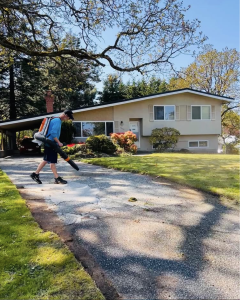Battery Power Is Quietly Taking Over

There’s a quieter, cleaner buzz replacing the roar of gas-powered tools across British Columbia. Battery-powered mowers, blowers, trimmers, and ride-ons are shifting from niche novelty to practical necessity.
There are two major developments driving electrification in the garden care industry:
1. Battery breakthroughs: Lithium-ion batteries now offer significantly longer runtimes, faster charging, and better longevity. Many newer machines are now using lithium iron phosphate (LFP) batteries, and although they’re a little bigger than the older lithium-ion kind, they last longer, handle more charge cycles, and are less likely to overheat. For pros who work all day or homeowners who want their gear to last for years, that’s a win. Manufacturers are also bumping up voltages, so equipment can deliver more power without getting heavier. That means cordless tools and ride-on mowers that feel stronger and run longer between charges — without burning out motors or wires. What’s more, modern batteries don’t just store power — they “think”. Built-in “battery management systems” keep cells balanced, prevent damage from overcharging, and even send you updates about health and run time. For fleets, this can mean fewer surprises and less downtime.
2. Policy momentum: CleanBC is pushing for cleaner equipment adoption, while municipalities—motivated by air-quality and noise concerns—are regulating tiny gas engines more strictly. While this policy shift is occurring, governments rebates to help the shift to electrification are currently centred on homes, buildings, and zero-emission vehicles. There is a lot of transformation necessary. Still, there are some programs that support the phase out of gas powered equipment, like this one in the Okanagan, BC, which offers modest refunds when residents trade gas tools for electric versions.
What Victoria and Oak Bay Are Doing
Oak Bay: By a unanimous vote in May 2022, Oak Bay enacted a three-year phase-out of all gas-powered residential landscaping equipment—leaf blowers, mowers, chainsaws—fully effective by 2026. Municipal crews switched earlier, with a 2025 target.
Victoria: The Noise Bylaw currently limits noise levels and operating hours. Council has considered—but not yet passed—a ban on gas landscaper gear: watch this space.
Although residents and business owners are waiting for clearer signalling from government, the future is obviously electric. Technology and policy shifts are already happening side by side, and the momentum continues to build.
As to the technology, despite all the shifts that are already happening, we are still only warming up. Solid-state batteries — the kind promising super-fast charging and extra range, which are only now starting to appear in the latest EVs — aren’t here for yard gear just yet. But as they become more common in cars, we’ll start to see them trickle down to smaller machines too. And that could be a true game changer.
The bottom line is, whether you’re trimming hedges or cruising the golf course, battery tech is making the experience quieter, cleaner, and a whole lot easier. The days of “electric can’t keep up” are now behind us — and the next few years will only bring more power, more convenience, and more fun.
Each of us can be a part of that shift, so don’t be afraid to reach out to your local counsel or EV association, and see how you can help in the energy transition.


